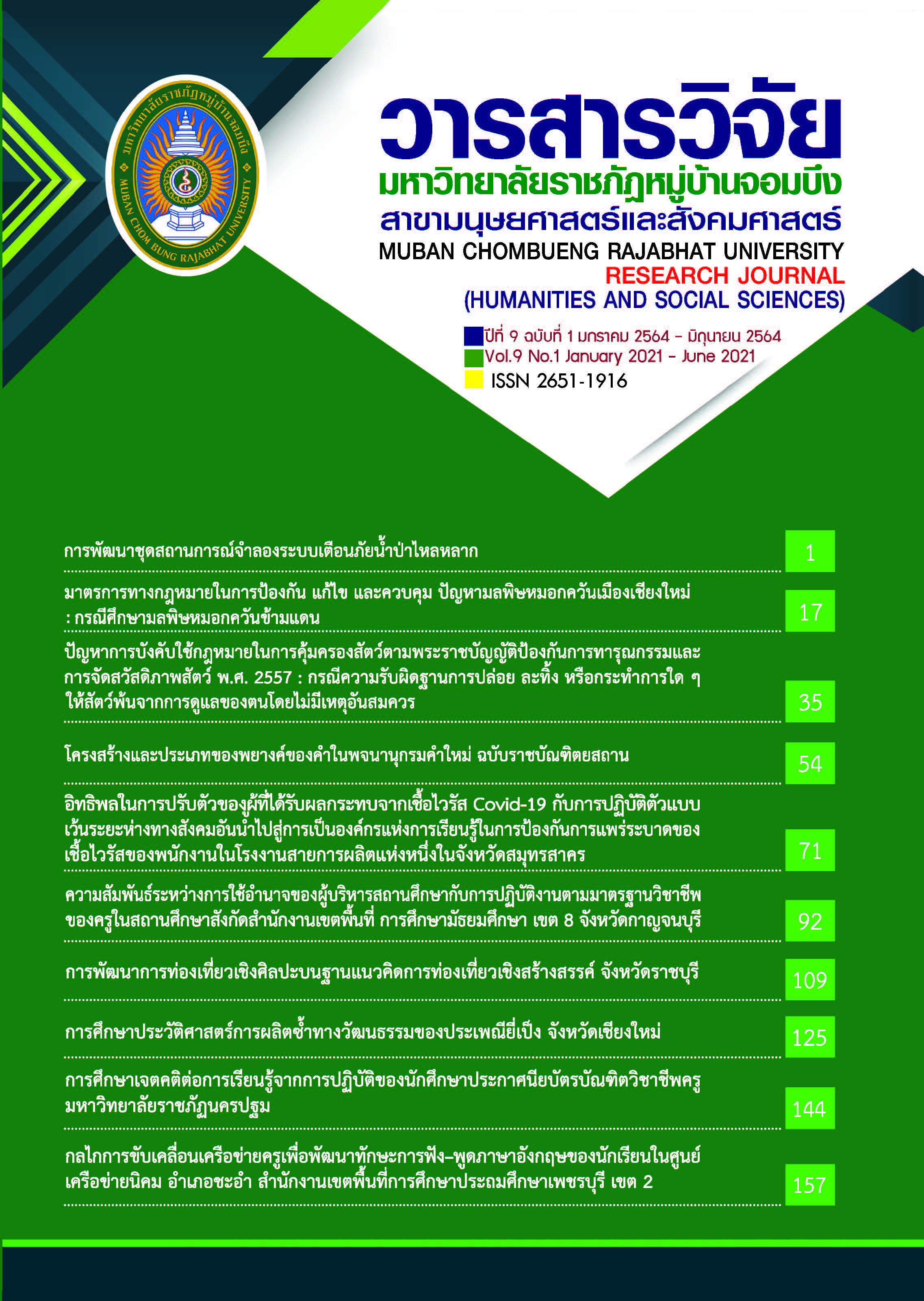อิทธิพลในการปรับตัวของผู้ที่ได้รับผลกระทบจากเชื้อไวรัส Covid-19 กับการปฎิบัติตัวแบบเว้นระยะห่างทางสังคมอันนำไปสู่การเป็นองค์กรแห่งการเรียนรู้ในการป้องกันการแพร่ระบาดของเชื้อไวรัสของพนักงานในโรงงานสายการผลิตแห่งหนึ่งในจังหวัดสมุทรสาคร
คำสำคัญ:
การปรับตัว, เว้นระยะห่างทางสังคม, องค์กรแห่งการเรียนรู้, การแพร่ระบาดของไวรัส โคโรน่าหรือโควิด19, จังหวัดสมุทรสาครบทคัดย่อ
การวิจัยครั้งนี้มีวัตถุประสงค์เพื่อศึกษา 1) การปรับตัวที่มีผลต่อการเว้นระยะห่างทางสังคม 2)การปรับตัวที่มีผลต่อองค์กรแห่งการเรียนรู้ 3) การเว้นระยะห่างทางสังคมที่มีผลต่อองค์กรแห่งการเรียนรู้ โดยกลุ่มตัวอย่างเป็นพนักงานโรงงานสายการผลิตในจังหวัดสมุทรสาครจำนวน 199 คน เก็บตัวอย่างโดยใช้แบบสอบถามเป็นเครื่องมือในการเก็บรวบรวมข้อมูล วิเคราะห์ข้อมูลกลุ่มตัวอย่างด้วยสถิติพรรณนา ร้อยละ ค่าเฉลี่ย ส่วนเบี่ยงเบนมาตรฐาน รวมถึงวิเคราะห์ความสัมพันธ์ระหว่างตัวแปรด้วยสหสัมพันธ์เพียร์สัน และการถดถอยเชิงพหุ ผลการวิจัยการปรับตัวมีผลต่อการเว้นระยะห่างทางสังคม ภาวะวิกฤต ก่อให้เกิดพฤติกรรมการตั้งรับกับสถานการณ์ อันนำไปสู่การปรับตัวให้สามารถคงอยู่กับสถานการณ์ได้ การพูดคุย การถ่ายถอดประสบการณ์ การเรียนรู้ นำไปสู่การปรับตัวเพื่ออยู่รอดในสภาวะวิกฤตของผู้คนที่ต้องเผชิญหน้ากับการแพร่ระบาดของไวรัส Covid-19 การหลีกเลี่ยงสถานที่เสี่ยง การปฏิบัติ ตัวแบบลดความเสี่ยง เป็นวิธีการปฎิบัติตัวใหม่ที่ควรปฏิบัติเพื่อป้องกันการแพร่ระบาดที่ดี การวิจัยการปรับตัวมีผลกับองค์กรแห่งการเรียนรู้ และการเว้นระยะห่างทางสังคมมีผลต่อองค์กรแห่งการเรียนรู้ การปรับตัวและการเว้นระยะห่างทางสังคม เป็นการปฏิบัติที่มีการสานต่อ ทำซ้ำ เพื่อป้องกันการแพร่ระบาดของ Covid-19 นำไปสู่การปฏิบัติแบบวิถีใหม่ เป็นการเรียนรู้จากบุคคลสู่สาธารณะจนเกิดเป็นองค์กรแห่งการเรียนรู้ ผู้วิจัยได้เสนอข้อแนะนำไว้ในงานวิจัยเพื่อนำไปพัฒนาและปรับปรุงองค์กรสู่องค์กรแห่งการเรียนรู้จากสถานการณ์วิกฤตในปัจจุบัน
เอกสารอ้างอิง
กระทรวงสาธารณสุข. (2563). แนวทางการปฏิบัติด้านสาธารณสุขเพื่อการจัดการภาวะระบาดของโรคโควิท-19 ในข้อกำหนดออกตามความในมาตรา 9. แห่งพระราชกำหนดการบริหารราชการในสถานการณ์ฉุกเฉิน พ.ศ.2548 (ฉบับที่ 1), 1,1-95.
กระทรวงอุตสาหกรรม. (2563). 7 วิธีเว้นระยะห่างทางสังคม SOCIAL DISTANCING ต้านภัย COVID-19, สืบค้นเมื่อ 2 กรกฎาคม 2563, จากhttp://www.industry.go.th/industry/ index.php/th/about / 2017-04-20-15-23-14/item/41219-7-social-distancing.
กรมควบคุมโรค กระทรวงสาธารณสุข. (2563). กรมควบคุมโรค แนะประชาชนเพิ่มระยะห่างทางสังคม, สืบค้นเมื่อ 2 กรกฎาคม 2563, จาก https://ddc.moph.go.th/brc/news.php?news =12278&deptcode=brc.
จันทรา อุดมและหะริน สัจเดย์. (2561). การคิดเชิงระบบและการพัฒนาองค์กรแห่งการเรียนรู้เพื่อขับเคลื่อนสังคมความรู้. วารสาร มจร สังคมศาสตร์ปริทรรศน์, 7(3), 244-259.
จิรวัฒน์ ทิพยรส. (2562). การพัฒนาทรัพยากรมนุษย์ในองค์การไปสู่องค์การนวัตกรรมในยุคประเทศไทย 4.0. วารสารปาริชาต, 32(1), 1-33.
ฉัฐวัฒน์ ชัชณาภัฏฐ์. (2563). การจัดการองค์การในภาวะวิกฤต กรณีโรคติดเชื้อไวรัส Covid-19. วารสารวิชาการธรรมทรรศน์, 20(4), 197-207.
ชัยภัทร ทองอยู่ บุญชม ศรีสะอาดและ อมร มะลาศรี. (2558). ความสัมพันธ์ระหว่างอัตมโนทัศน์ ความเชื่อมั่นในตนเอง และการปรับตัวทางสังคมกับทักษะชีวิต ของนิสิตระดับปริญญาตรี. วารสาร การจัดผลการศึกษา มหาวิทยาลัยมหาสารคาม, 21(1), 83-94.
ชุติมา เพชรรัตน์และสุริยะ เจียมประธานรากร. (2558). การจัดการความรู้เพื่อขับเคลื่อนมหาวิทยาลัยราชภัฏสวนดุสิตสู่องค์กรแห่งการเรียนรู้. วารสารราชภัฏสวนดุสิต, 11(1), 154-161.
ณฤดี วิวัชภูรี. (2555). ADAP : ปรับตัว. วารสารสันติศึกษาปริทรรศน์, 3(1), 144-157.
จงกลณี ตุ้ยเจริญ, ณิชกานต์ วงษ์ประกอบ, กฤตกร หมั่นสระเกษ และธิดารัตน์ นิ่มกระโทก. (2563). การรับมือกับไวรัสโคไรนา Covid-19 ในงานสาธารณสุขมูลฐาน. วารสารวิทยาศาสตร์สุขภาพ,4(3), 1-20.
นิภาพรรณ เจนสินติกุล. (2563). แรงงานในสถานการณ์แพร่ระบาดของไวรัสโคโรนา (Covid-19): มาตรการของรัฐบาลและผลกระทบ. วารสารสหวิทยาการมนุษยศาสตร์และสังคมศาสตร์, 3(3), 601-612.
น้ำทิพย์ วิภาวิน. (2563). ชุดข้อมูลวิจัยแบบเปิดไวรัสโควิด-19: ข้อมูลเปิดสำหรับชุมชนวิจัยทั่วโลก.วารสารห้องสมุด, 64(1), 36-46.
ธนาคารแห่งประเทศไทย. (2563). Economic recovery in the new normal. BOT พระสยาม MAGAZINE, 43(3), 5-7.
ธนพร แย้มสุดา. (2561). การจัดการความรู้ : เครื่องมือขับเคลื่อนสู่องค์กรแห่งการเรียนรู้และองค์กรขีด สมรรถนะสูง. วารสารแพทย์นาวี, 45(1), 170-181.
ประชาชาติธุรกิจ. (2563, ธันวาคม 21) สมุทรสาคร โควิดระลอกใหม่ทุบอุตสาหกรรมเสียหายวันละ 1,000 ล้าน. ประชาชาติธุรกิจ, 1.
ปัญญา เลิศไกร, ศิริพร หมื่นพัสถ์ และลัญจกร นิลกาญจน์. (2560). การพัฒนาองค์การการเรียนรู้เชิง ทฤษฎี. วารสารนาคบุตรปริทัศน์, 9(1), 172-180.
ภาวินี ซุ่นทรัพย์และสำเริง อ่อนสัมพันธ์. องค์กรแห่งการเรียนรู้ของศูนย์การศึกษานอกระบบและ การศึกษาตามอัธยาศัย อำเภอเมือง (2563). วารสารการบริหารการศึกษา, 11(1), 165-180.
วินีกาญจน์ คงสุวรรณ วันดี สุทธรังษี และวิลาวรรณ คริสต์รักษา. (2558). การปรับตัวในการเผชิญภาวะ วิกฤตจากอุทกภัยของผู้ประสบอุทกภัย อำเภอหาดใหญ่ จังหวัดสงขลา. วารสารพยาบาลศาสตร์, 27(3), 105-118.
วิเชียร รู้ยืนยง พงษ์ศักดิ์ ผกามาศและสังวาลย์ เพียยุระ. (2016). บทบาทของผู้บริหารในการจัดองค์กรแห่งการเรียนรู้ของสถาบันการอาชีวศึกษาในภาคตะวันออกเฉียงเหนือ. วารสารศึกษาศาสตร์ มหาวิทยาลัยขอยแก่น, 39(1), 70-79.
สุทธิศักดิ์ เท่าธุรี. (2544). การรับรู้และการปรับตัวของประชาชนบ้านน้ำก้อ ภายหลังเกิดภัยพิบัติ อุทกภัย ปี พ.ศ. 2544. วิทยานิพนธ์ศิลปศาสตรมหาบัณฑิต สาขาวิชาการจัดการมนุษย์กับ สิ่งแวดล้อม มหาวิทยาลัยเชียงใหม่.
สุพรรษา วรมาลี, อุ่นเรือน กลิ่นขจร, อำพวรรณ์ ยวนใจและกมลทิพย์ กุลวิภากร. (2563). ผู้ป่วยติดเชื้อ Coronavirus disease 2019 ในห้องแยกความดันลบ:กรณีศึกษา. เวชบันทึกศิริราช, 13(4), 261-271.
สุรัยยา หมานมานะ, โสภณ เอี่ยมศิริถาวร และสุมนมาลย์ อุทยมกุล. (2563). โรคติดเชื้อไวรัสโคโรนา 2019 (COVID-19). วารสารสถาบันบำราศนราดูร, 14(2), SE1-10.
สมประวิน มันประเสริฐ. (2563). พลิกโฉมธุรกิจหลังวิกฤตโควิท-19, สืบค้นเมื่อ 15 มิถุนายน 2562, จาก https://www.krungsri.com/th/plearn-plearn/business-transformative-after- covid.
สมเกียรติ ตั้งกิจวานิชย์. (2563). คำถามและ4โจทย์ว่าด้วยการสนทนาเรื่อง “ความปกติใหม่” ใน “โลกหลังโควิท”, สืบค้นเมื่อ 21 มกราคม 2563 จาก https://tdri.or.th/2020/04/new- normal-in-post-covid-world/.
อรรณพ จีนะวัฒน์. (2559). การพัฒนาตนของผู้ประกอบวิชาชีพครู. Veridian E-Journal, 9(2), 1379-1395.
Andrew, H.A. and Roy, C. (1991). Overview of the physiologic mode. In George, J. (Ed.). Nursing theories: the base for professional nursing practice. Norwalk, Connecticut: Appleton & Lange.
Green network. (2020). ( May 7, 2020) ทางรอดและโอกาสอุตสาหกรรมอาหารและเครื่องดื่มไทย ในวิกฤติ โควิท-19. PR NEW, 1.
Hinkle, D.E, William, W., & Stephen, G. J. (1998). Applied statistics for the behavior science (4th ed.). New York, NY: Houghton Miffllin.
Phosri S. (2020). ผลประเมินภาวะเสี่ยงตกงานในวิกฤตโควิด-19 แรงงานนอกระบบกระทบหนักสุด, สืบค้นเมื่อ 25 มกราคม 2563 จาก https://www.bltbangkok.com/news/20617/.
Roy, C. and Adrews, H. A. (1999). The Roy adaptation model. (2nd ed). In McEwen, M. and Wills, E. (Ed.). Theoretical basis for nursing. USA: Lippincott Williams & Wilkins.
Senge PM. (1990). The Fifth Discipline: The art & practice of the learning organization. New York, Double Day.
Stevens, J. (1992). Applied multivariate statistics for the social science. (2nd ed.). New York, NY: Harper and Row.
Thongsawai, M, Na Taguatung, Promwong C. (2013). Developing ICT Learning Organization Strategy in Higher Education Institutes of Thailand. วารสารห้องสมุด, 57(2), 1-6.
Yamane. (1967). Taro Statistic: An Introductory Analysis. New York: Harper & row.
ดาวน์โหลด
เผยแพร่แล้ว
รูปแบบการอ้างอิง
ฉบับ
ประเภทบทความ
สัญญาอนุญาต
วารสาร TCI อยู่ภายใต้การอนุญาต Creative Commons Attribution-NonCommercial-NoDerivatives 4.0 International (CC BY-NC-ND 4.0) เว้นแต่จะรุบุไว้เป็นอย่างอื่นโปรดอ่านหน้านโยบายของเราสำหรับข้อมูลเพิ่มเติมเกี่ยวกับการเช้าถึงแบบเปิด ลิขสิทธิ์ และการอนุญาต



